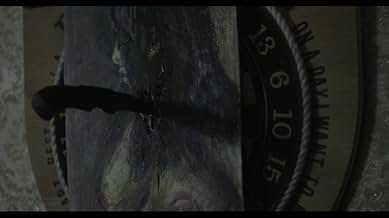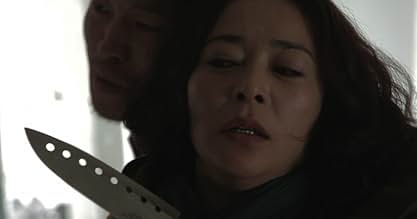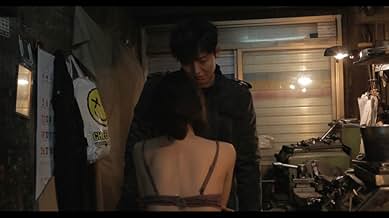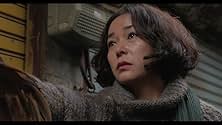A loan shark is forced to reconsider his violent lifestyle after the arrival of a mysterious woman claiming to be his long-lost mother.A loan shark is forced to reconsider his violent lifestyle after the arrival of a mysterious woman claiming to be his long-lost mother.A loan shark is forced to reconsider his violent lifestyle after the arrival of a mysterious woman claiming to be his long-lost mother.
- Awards
- 25 wins & 30 nominations total
Lee Jung-Jin
- Gang-Do
- (as Jeong-jin Lee)
Woo Ki-hong
- Hoon-chul
- (as Ki-Hong Woo)
Cho Jae-ryong
- Tae-seung
- (as Jae-ryong Cho)
Heo Joon-seok
- Suicidal Man
- (as Jun-seok Heo)
Yu Ha-bok
- Container man
- (as Ha-bok Yu)
- Director
- Writer
- All cast & crew
- Production, box office & more at IMDbPro
Featured reviews
The 18th feature film written & directed by Korean cinema's most notorious filmmaker, Pietà tells the story of a sadistic loan shark who ends up crippling people for not paying their debts, which after added interest is 10 times the amount they borrowed. Torturing with no feelings, his life takes a changing course when a middle-aged woman claiming to be his long lost mother comes into his life out of nowhere.
The film has all the disturbing elements one expects from Kim Ki-duk and although the first half has no easy-to-digest moments, the second half plays out very well to end on a satisfying, even rewarding, note. Cinematography reflects the appalling nature of the subject matter while editing presents a well-sought balance. The performances are pretty impressive from its two leads & the rest of filmmaking aspects are finely executed as well.
On an overall scale, Pietà is a highly tragic story of love, loss, revenge & redemption that has much more to offer than just disgust its viewers. Sure, Kim Ki-duk takes extreme pleasure in making his audience flinch but he also backs it up with enough justifications for the violence in his films. Shocking, unnerving, pitiful, haunting & infused with Christian symbolisms, Pietà is an unsettling psychological study of a mother-son relationship that also presents a fascinating take on what famously is Korean cinema's favourite genre.
The film has all the disturbing elements one expects from Kim Ki-duk and although the first half has no easy-to-digest moments, the second half plays out very well to end on a satisfying, even rewarding, note. Cinematography reflects the appalling nature of the subject matter while editing presents a well-sought balance. The performances are pretty impressive from its two leads & the rest of filmmaking aspects are finely executed as well.
On an overall scale, Pietà is a highly tragic story of love, loss, revenge & redemption that has much more to offer than just disgust its viewers. Sure, Kim Ki-duk takes extreme pleasure in making his audience flinch but he also backs it up with enough justifications for the violence in his films. Shocking, unnerving, pitiful, haunting & infused with Christian symbolisms, Pietà is an unsettling psychological study of a mother-son relationship that also presents a fascinating take on what famously is Korean cinema's favourite genre.
Korean thriller movies always surpries me with it's ending. We get through one concept and it turns to be another. While I was watching this, I thought it is a story of mother and son who were somehow separated. But the movie proves me wrong. Its not about the separation and reunion of mother son its about untold revenge.
It's a dark and brutal morality tale of guilt and redemption, the movie "PIETA" tells a story of a debt collector Kang-do(Lee Jeong-jin) works as a debt collector for some loan shark, and he is someone you don't want to mess with especially if you happen to borrow the money from his boss. Even if his poor debtors really have no money to pay back, he gets the money back by any ruthless means necessary. These unfortunate debtors usually work at the metal shops located on the narrow alleys of Seoul, so they are forced to get their hands or feet injured by their machines for paying him back through the insurance money they will acquire. During one comic but cringe-inducing moment, one debtor nervously asks him to cut both of his hands instead of only one hand because he needs more money to pay his debts and support his baby to be born.
Kang-do's life is as barren as his debtors'. While his home looks a little more comfortable, he has lived alone in his apartment. He cooks for himself, and he usually brings live animals to his home for his dinner. To represent his beastly nature, he prefers to buy a live chicken and then butcher it instead of just purchasing a dead one. On one day, his life is disrupted by the sudden appearance of one mysterious woman(Cho Min-soo), who claims to be his mother and apologizes to him for abandoning him not so long after he was born. Resentful toward his mother he does not remember, he does not believe any of her words and brusquely rejects her, but she keeps coming to him. She slowly insinuates herself into his daily life while behaving like a mother who tries to compensate for her unforgivable fault in the past. Though he harshly treats her, she sticks to him while doing what mothers usually do for their dear sons. She cooks for him, and she says genially to this detestable man who has probably never experienced love or kindness for a long time.
There is quite a disturbing scene where Kang-do cruelly attempts to violate her with his own twisted logic, and you may wonder how much she can tolerate him, if she is indeed who she seems to be. Induced by her love without condition, Kang-do slowly reveals a vulnerable child with lots of hurts inside him; he eventually finds himself depending on her care, and they momentarily have a nice time together as a mother and her son.The tension in the drama largely depends on the simple but fearless performance by Cho Min-soo, who deftly maintains the elusive side of her character even at the most emotionally anguished moment. Their characters may look silly when they behave like a mother and her little son, but we come to accept the emotional bond forming between them.
And later scenes become very intense and heart touching. Overall I do not think it is one of his best films because of its several flaws, but I must say it is nice to see that this talented director is still capable of making a movie with conviction, power, and several interesting things to talk about.
Kang-do's life is as barren as his debtors'. While his home looks a little more comfortable, he has lived alone in his apartment. He cooks for himself, and he usually brings live animals to his home for his dinner. To represent his beastly nature, he prefers to buy a live chicken and then butcher it instead of just purchasing a dead one. On one day, his life is disrupted by the sudden appearance of one mysterious woman(Cho Min-soo), who claims to be his mother and apologizes to him for abandoning him not so long after he was born. Resentful toward his mother he does not remember, he does not believe any of her words and brusquely rejects her, but she keeps coming to him. She slowly insinuates herself into his daily life while behaving like a mother who tries to compensate for her unforgivable fault in the past. Though he harshly treats her, she sticks to him while doing what mothers usually do for their dear sons. She cooks for him, and she says genially to this detestable man who has probably never experienced love or kindness for a long time.
There is quite a disturbing scene where Kang-do cruelly attempts to violate her with his own twisted logic, and you may wonder how much she can tolerate him, if she is indeed who she seems to be. Induced by her love without condition, Kang-do slowly reveals a vulnerable child with lots of hurts inside him; he eventually finds himself depending on her care, and they momentarily have a nice time together as a mother and her son.The tension in the drama largely depends on the simple but fearless performance by Cho Min-soo, who deftly maintains the elusive side of her character even at the most emotionally anguished moment. Their characters may look silly when they behave like a mother and her little son, but we come to accept the emotional bond forming between them.
And later scenes become very intense and heart touching. Overall I do not think it is one of his best films because of its several flaws, but I must say it is nice to see that this talented director is still capable of making a movie with conviction, power, and several interesting things to talk about.
Pieta (Meaning- A representation of the Virgin Mary mourning over the dead body of Jesus) a new film from Kim Ki-Duk, one of the genius directors working today.
Like his other movies, it is no different as it has all his key ingredients like; less dialogues, rural setting, on location shoot, assessment of relations and definitely metaphors.
The story of the film revolves around a depraved loan-shark who is reasonably heated, loaned money to the employees of industrial field. He beats and cripples the people who cannot pay the interests which is 10 times. The anger and sheer violence has become a part of his frenzy life.
Unexpectedly, enters a woman in his life claiming to be his mother who had abandoned him in his childhood. Presentation of relationship between these two people is fairly shocking and humane at the same time and it leads to an aftermath eventually.
Kim Ki-Duk has done some great character study here; it shows the moment of transcendence, ecstasy, agony and fulfillment. A revenge story will always have its murky side but keeping all the clichés aside, it makes you think that storytelling can change your life. You can feel the cruelty however; it is only suggestive and not happening on the screen, it can shake the ethics of humankind.
Highly recommended to the lovers of quality and Kim Ki-Duk movies.
Like his other movies, it is no different as it has all his key ingredients like; less dialogues, rural setting, on location shoot, assessment of relations and definitely metaphors.
The story of the film revolves around a depraved loan-shark who is reasonably heated, loaned money to the employees of industrial field. He beats and cripples the people who cannot pay the interests which is 10 times. The anger and sheer violence has become a part of his frenzy life.
Unexpectedly, enters a woman in his life claiming to be his mother who had abandoned him in his childhood. Presentation of relationship between these two people is fairly shocking and humane at the same time and it leads to an aftermath eventually.
Kim Ki-Duk has done some great character study here; it shows the moment of transcendence, ecstasy, agony and fulfillment. A revenge story will always have its murky side but keeping all the clichés aside, it makes you think that storytelling can change your life. You can feel the cruelty however; it is only suggestive and not happening on the screen, it can shake the ethics of humankind.
Highly recommended to the lovers of quality and Kim Ki-Duk movies.
As a massive fan of Korean director Kim Ki-duk - I've never seen a film of his I haven't loved - I was eager to see what delights his new film PIETA had in store for the viewer. In some ways it's similar to a lot of his previous filmography, like BAD GUY, in which the protagonist is also the antagonist, and also similar to other Korean films I've seen like BREATHLESS.
The main character is a ruthless loan shark who makes a living from crippling those who owe him money; he gets the money back from their insurance claims. The glacial Lee Jeong-jin gives an icy turn as a truly horrible creation, but inevitably he thaws a little once you get to know him, and once the plot kicks in. This is a revenge story, but one done in a way that's both subtle and convoluted; it's a film that rewards close attention, else you won't have a clue what's going on.
Jo Min-soo bags the film's most interesting role of the long-lost mother who turns up seeking reconciliation. It's a difficult, unsympathetic part to play, and there are one or two sexual situations which go way beyond the realms of bad taste into some of the most disgusting things I've ever seen. As ever, though PIETA isn't really an explicit film, despite the sheer quantity of violent incidents that happen during the running time, and as a story it gets more and more engrossing as it goes on. The end is particularly profound, and the lush cinematography on a tiny budget makes this a beautiful film to watch, despite the depravity.
The main character is a ruthless loan shark who makes a living from crippling those who owe him money; he gets the money back from their insurance claims. The glacial Lee Jeong-jin gives an icy turn as a truly horrible creation, but inevitably he thaws a little once you get to know him, and once the plot kicks in. This is a revenge story, but one done in a way that's both subtle and convoluted; it's a film that rewards close attention, else you won't have a clue what's going on.
Jo Min-soo bags the film's most interesting role of the long-lost mother who turns up seeking reconciliation. It's a difficult, unsympathetic part to play, and there are one or two sexual situations which go way beyond the realms of bad taste into some of the most disgusting things I've ever seen. As ever, though PIETA isn't really an explicit film, despite the sheer quantity of violent incidents that happen during the running time, and as a story it gets more and more engrossing as it goes on. The end is particularly profound, and the lush cinematography on a tiny budget makes this a beautiful film to watch, despite the depravity.
Did you know
- TriviaShot digitally on two Canon EOS 5D Mark II DSLR cameras. The director operated one of the cameras himself.
- ConnectionsFeatured in At the Movies: Venice Film Festival 2012 (2012)
- How long is Pieta?Powered by Alexa
Details
Box office
- Budget
- €103,000 (estimated)
- Gross US & Canada
- $22,080
- Opening weekend US & Canada
- $6,222
- May 19, 2013
- Gross worldwide
- $6,616,296
- Runtime1 hour 43 minutes
- Color
- Sound mix
- Aspect ratio
- 1.85 : 1
Contribute to this page
Suggest an edit or add missing content






























